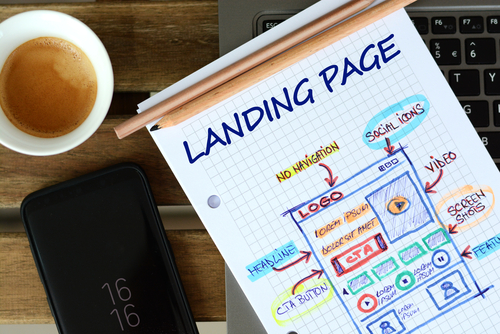Establishing your online presence as an insurance agent is important to have a great website. However, landing pages are crucial when implementing digital marketing strategies as they are key to getting leads, increasing referrals, and making sales. Sending all your online traffic to your website homepage can be a mistake as it can waste your time and effort if you do not have a good landing page.
So, what is a landing page? Simply put, a landing page is a web page that stands alone and isn’t joined to your site. Landing pages have only one purpose and are specific to campaigns. They are used to drive conversion by asking visitors to subscribe to your blog, register for an event, get a quote, or perform an action relevant to the campaign you created the landing page for.
You can drive traffic to your landing page through social media, email, or organic search. However, the most common medium is paid advertising. This is common because you can make a page that suits the purpose of the ad a visitor clicks on. Using a landing page during a marketing campaign can increase your chances of converting leads to prospects.
What are the Differences Between a Landing Page and Your Website?
Landing pages are different from websites as they operate differently. Landing pages are made to drive visitors toward conversion. Sending visitors to your website’s homepage may confuse them and reduce your chances of getting a conversion. The first key difference between a landing page and a website is the number of pages. A standard website contains as many pages as you include, while a landing page has only one page.
Also, websites or homepages are created for a general purpose. Visitors can click and spend time checking different links on the site. On the other hand, a landing page is only focused on driving conversions and not explorations. A landing page only communicates a message, while your website includes as many things as your agency wants to communicate.
Another key difference is that a homepage contains links that will take visitors to wherever they should go, while a landing page includes only one link: the link you want the prospect to click. Lastly, a landing page only gets targeted traffic, while a website receives all traffic.
How to Create a Good Landing Page
A good landing page must meet specific criteria: First, it must include only one page. Unlike websites with different pages, links, and formats, a landing page should be kept simple and never more than one page. For example, a landing page doesn’t need a menu bar containing different tabs. Instead, it should only have a scrolling page that can be divided into sections.
Also, a landing page should include a call to action. It is important to let your prospects know what they need to do after getting on your page. The call to action should be straightforward and compelling. You can include specific words that prompt your prospects to take action. Within a short while of getting to the page, visitors should know what the page is about, your product, and the action to take.
Ensure you do not include complicated or technical content. Also, visual elements such as images and videos can help create a good landing page. Including visual elements can help to increase your chances of converting leads. Lastly, to create an effective landing page, ensure you leave room to capture visitors’ information. You can include a form for your prospects to enter their information.
Benefits of Landing Pages
Landing Pages Help to Achieve Your Business Goals
One of the main advantages of a landing page is that they allow you to achieve your goals, such as converting leads, reaching a new market, getting new customers, or closing sales. Landing pages help to reach certain business goals as they are catered to specific audiences or goals. You can design your landing page around specific actions.
They Increase Conversions
A good landing page will contain a compelling call to action. This can influence the visitors’ decision to take action. Compared to a website, a landing page helps to set up a clear action for users to take in a simple format. Visitors can easily spot what the page is about and what they need to do. The more conversions you have, the more sales you close.
Landing Pages Help to Capture Important Data
After linking a landing page to a campaign or other sources, you can easily view which topics or offerings get the most interest. They also help you to know the highest-performing campaigns and user behavior. A good landing page can provide valuable insight, helping you refine your knowledge and your campaign strategies. You can gather important data from your visitors by including a form on your landing page.
Landing Pages Can Help to Grow Your Mailing List
Landing pages help to drive lead generation. You can gather visitors’ emails by asking for their information on the landing page. Through this, visitors can receive vital email updates.
Landing Pages Improve Brand Awareness
Through consistent branding, you can improve your brand awareness. A landing page helps to increase the consistency of your branding across different media. It provides more opportunities for visitors to engage with your agency. For more information and help, visit us today at Western Marketing.

